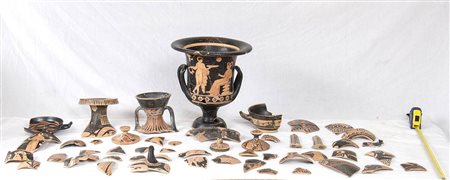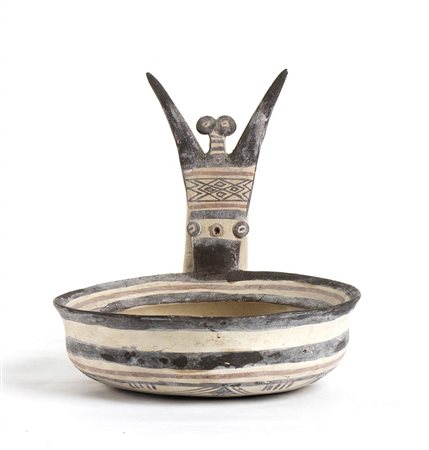Auction 85 - Antiquities
-

Lot 49 GROUP OF APULIAN AND CAMPANIAN VESSELS AND FRAGMENTS
5th - 4th century BC
This large lot is composed of a rich group of vessels, which are interesting examples of the Apulian and Campanian manufacture. The lot includes a red-figure restored krater, calyx type, lids and various fragments of kylikes or skyphoi, amphorae, olpai and kraters. Several fragments are also in black-figure. The iconographic themes refer to the Dionysian and ritual sphere. Provenance: Collection returned by the German Judicial Authority to Herakles Numismatik und Antiquitäten GmbH (München), who acquired it on the European art market since the 1970s; from 2000s the entire collection is located in the United Kingdom; some objects of this collection were bought subsequently by the Italian Government (e.g.: bari.repubblica.it - Archeologia, torna in Puglia la stele dauna di oltre 2.500 anni fa: presa all'asta con una colletta). Almost all objects need restoration, if well executed will be an excellent investment, also a good exercise for scientific or academic purposes. Lot sold as seen, no returns. -

Lot 50 GROUP OF CANOSINE AND APULIAN VESSELS AND FRAGMENTS
4th - 3rd century BC
This large lot is composed of a rich group of vessels, which are interesting examples of the Apulian polychrome pottery, from Canosine, Daunian and Gnathia manufactures. The lot includes fragments and partially preserved vessels, as: skyphos, cup-skyphos, jugs, oinochoai, olle, lebes and lekanis lids, cups; rare examples of thymiaterions, an altar, a standing winged goddess, doves and pome, typicals of the Canosine figurative vases. Provenance: Collection returned by the German Judicial Authority to Herakles Numismatik und Antiquitäten GmbH (München), who acquired it on the European art market since the 1970s; from 2000s the entire collection is located in the United Kingdom; some objects of this collection were bought subsequently by the Italian Government (e.g.: bari.repubblica.it - Archeologia, torna in Puglia la stele dauna di oltre 2.500 anni fa: presa all'asta con una colletta). Almost all objects need restoration, if well executed will be an excellent investment, also a good exercise for scientific or academic purposes. Lot sold as seen, no returns. -

Lot 51 GROUP OF CANOSINE AND APULIAN VESSELS AND FRAGMENTS
4th - 3rd century BC
This large lot is composed of a rich group of vessels, which are interesting examples of the Apulian polychrome pottery, from Canosine, Daunian and Gnathia manufactures. The lot includes fragments and partially preserved vessels, as: skyphos, cup-skyphos, jugs, oinochoai, olle, lebes and lekanis lids, cups; rare examples of thymiaterion, an altar, a pyxis, doves, typicals of the Canosine figurative vases. Provenance: Collection returned by the German Judicial Authority to Herakles Numismatik und Antiquitäten GmbH (München), who acquired it on the European art market since the 1970s; from 2000s the entire collection is located in the United Kingdom; some objects of this collection were bought subsequently by the Italian Government (e.g.: bari.repubblica.it - Archeologia, torna in Puglia la stele dauna di oltre 2.500 anni fa: presa all'asta con una colletta). Almost all objects need restoration, if well executed will be an excellent investment, also a good exercise for scientific or academic purposes. Lot sold as seen, no returns. -

Lot 52 DAUNIAN OLLA
Apulia, Subgeometric Period I, ca. 550 - 400 BC
height cm 22; diam. cm 24,5
Characterized by the typical broad funnel-shaped rim, the globular body and a pair of stylized animal protome between the arched handles. Sporadic lacks of the original colours and partially restored rim. Provenance: English private collection, according to the heirs possibly purchased in some auction or Art Gallery during 1970s-1980s. -

Lot 53 DAUNIAN OLLA
Apulia, Subgeometric Period III, ca. 400 - 300 BC
height cm 26,5; diam. cm 19
Provenance: Private collection, London; acquired in Brussels from Alara Gallery on 1994; formerly in an old German collection (Düsseldorf). -

Lot 54 DAUNIAN OLLA
Apulia, Subgeometric Period IIIb, ca. 350 - 300 BC
height cm 29,5; diam. cm 16,5
Characterized by two zoomorphic protome between handles. Provenance: Private collection, London; acquired in Brussels from Alara Gallery on 1994; formerly in an old German collection (Düsseldorf). -

Lot 55 DAUNIAN KYATHOS
Apulia, Subgeometric Period II, ca. 550 - 400 BC
height cm 13,5; diam. cm 13,5
Provenance: English private collection, according to the heirs possibly purchased in some auction or Art Gallery during 1970s-1980s. -

Lot 56 GREEK HELLENISTIC FLORAL PEDESTAL DISH
4th century BC
height cm 7; diam. cm 17
Intact. Provenance: English private collection, according to the heirs possibly purchased in some auction or Art Gallery during 1970s-1980s. -

Lot 57 GREEK HELLENISTIC BLACK-GLAZED STEMLESS KYLIX
South Italy, 4th century BC
height cm 5,5; diam. cm 12
With a stamed decoration on the inner surface, characterized by radiant petals and leaves. Provenance: English private collection, according to the heirs possibly purchased in some auction or Art Gallery during 1970s-1980s. -

Lot 58 GREEK HELLENISTIC BLACK-GLAZED LEBES WITH LID
South Italy, 4th century BC
height (with lid) cm 11; diam. cm 4,5
Provenance: English private collection, according to the heirs possibly purchased in some auction or Art Gallery during 1970s-1980s. -

Lot 59 GREEK HELLENISTIC BLACK-GLAZED GUTTUS
South Italy, 4th century BC
height cm 6,3; diam. cm 11
With Greek letters in the inner rim. Intact. Provenance: Private collection, London; acquired in Brussels from Alara Gallery on 1994; formerly in an old German collection (Düsseldorf). -

Lot 60 GREEK HELLENISTIC BLACK-GLAZED GUTTUS WITH SILENUS
South Italy, 4th century BC
height cm 12
Intact, with minor cooking cracks. Provenance: Private collection, London; acquired in Brussels from Alara Gallery on 1994; formerly in an old German collection (Düsseldorf). -

Lot 61 GREEK HELLENISTIC BLACK-GLAZED PINE CONE MOULDED JUG
South Italy, 4th century BC
height cm 8,5, diam. cm 6,5
Intact. Provenance: Property of a gentleman; acquired on the European art market between 1980s and 1990s -

Lot 62 ROMAN “DRESSEL 2-4” TYPE AMPHORA
1st century BC - 1st century AD
height (amphora) cm 102; height (with stand) cm 107; diam. cm 12,5
Its production was located in central Tyrrhenian area and in Spain and documents the growth of the wine trade within the Roman Provinces. Intact; on the shoulder a small circular stamp with the letter D. The encrustations visible on the vessel’s surface are caused by centuries of wear in the marine environment. Provenance: From a collector-entrepreneur of the past who lived between the US and Europe, bought in the 1980s. -

Lot 63 ROMAN “GAULOISE” TYPE AMPHORA
2nd - 3rd century AD
height (amphora) cm 59; height (with stand) cm 73; diam. cm 11
Restored by fragments, with few missing pieces. The encrustations visible on the vessel’s surface are caused by centuries of wear in the marine environment. Provenance: From a collector-entrepreneur of the past who lived between the US and Europe, bought in the 1980s. -

Lot 64 ROMAN GLASS RIBBED BOWL
1st -3rd century AD
height cm 4,5; diam. cm 15,3
Beautiful ribbed bowl of a trasparent bluish-green glass, with sporadic iridescence. Intact. Provenance: English private collection, purchased from Pierre J. Farrah in Beyrouth on 28 December 1960 and accompanied by an old photograph showing it. -

Lot 65 ROMAN OIL LAMP WITH GLADIATORS
1st - 2nd century AD
length cm 9,5
Provenance: English private collection, according to the heirs possibly purchased in some auction or Art Gallery during 1970s-1980s. -

Lot 66 ROMAN MULTINOZZLED OIL LAMP
2nd - 3rd century AD
height cm 10,5; length cm 14,5
Characterized by multiples nozzles. A moulded decoration is arranged on the surface; the depiction is complex and probably it is the representation of Europa’s myth. Intact. Provenance: English private collection, according to the heirs possibly purchased in some auction or Art Gallery during 1970s-1980s. -

Lot 67 AFRICAN RED SLIP OIL LAMP WITH PALM TREE
4th - 6th century AD
height cm 4,5; length cm 11,3
Intact and with the manufactures name on rear. Provenance: From the collection of a Diplomatic family since 1980s. -

Lot 68 AFRICAN RED SLIP FLASK
Workshop of Navigius, 270 - 320 AD
height cm 25,5; diam. cm 5,5
Roman mould-made flask, in a shape of a young man head. Great attention to the details, as visible from the hairs and eyebrown. Some scattered cracks and abrasions. Provenance: From the collection of a Diplomatic family since 1980s. -

Lot 69 BYZANTINE AMPHORA
5th - 7th century AD
height cm 57; diam. cm 14
Characterized by loop handles and by a bullet-like shape, with deeply incised ridges around the all body. This type is widespread in the Eastern Mediterranean and in the Black Sea. The encrustations visible on the vessel’s surface are caused by centuries of wear in the marine environment. Provenance: From a collector-entrepreneur of the past who lived between the US and Europe, bought in the 1980s. -

Lot 70 CYCLADIC MARBLE KANDILA
Early Cyladic I, ca. 3200 - 2700 BC
height cm 20; diam. cm 10
The kandila is characterized by: the trunconical neck fitted with a small rounded lip; the bulbous body with a narrow and flat shoulder; the triangular shaped foot; four small vertical handles with holes, which served to suspend and/or transport the container with a cord. Repaired. Provenance: English private collection, with a declaration of Elie Borowski, Basel 30th November 1972.
-

Lot 71 CYCLADIC MARBLE BEAKER
Early Cyladic I, ca. 3200 - 2700 BC
height cm 16; diam. cm 12
It was designed for suspension and intended as a liquid container. The beaker is one of the most elegant vessel forms developed by Cycladic manufacturing. The vessel is intact, with only some abrasions. Provenance: English private collection, with a declaration of Elie Borowski, Basel 30th November 1972. -

Lot 73 GREEK ATTIC MARBLE HEAD OF A WOMAN
4th century BC
height (head) cm 31; height (stand) cm 12; length cm 17 x 17
Larger than life-size Attic marble female head, perhaps of a goddess. The oval is elongated, with full cheeks and round chin. Eyes and eyelids are delicately molded, creating the effect of a deep gaze and a feeble smile. The forehead is framed by fine and soft locks tied back, that allow us to glimpse the ears. The face is partially damaged by ancient injuries: an ancient restoration made on back and top of the head is still visible through the traces of the Gradina (or tooth chisel) and the oxide of an iron pin. Published in the catalogue: Oliver Forge, Brendan Lynch: The Ancient World. From Mesopotamia to Coptic Egypt, London 30 June - 7 July 2017, n. 37. Provenance: English private collection; bought from Godson & Coles, London, 2002; acquired from a regional auction where it had been consigned for sale from a deceasede's estate, it is said owned by an English noble family who preferred to remain anonymous, descendant of a contemporary Lord Elgin's archaeologist.
